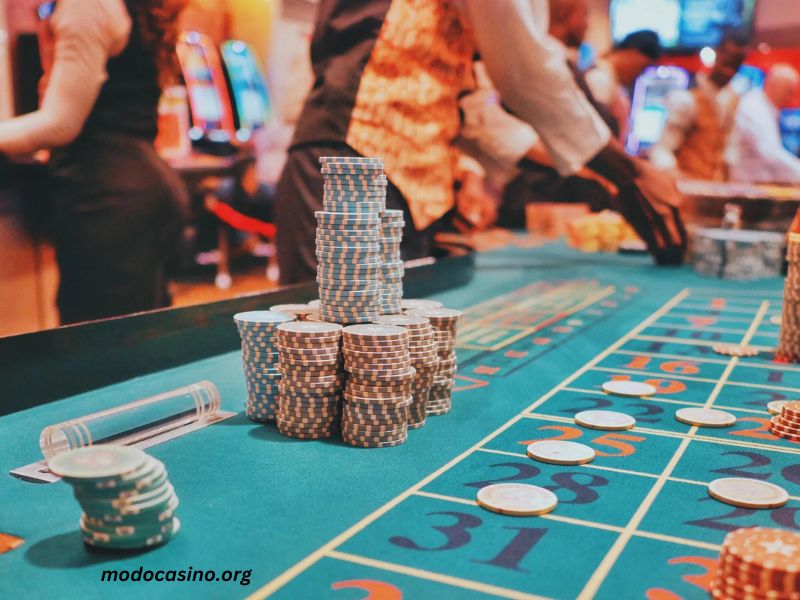In the world of casinos and gaming establishments, Table Games Dealers are the skilled professionals responsible for managing the flow of card and table games. These individuals play a crucial role in ensuring that games run smoothly, customers have an enjoyable experience, and the casino maintains its integrity and compliance with gaming regulations. This article will provide an in-depth look at the Table Games Dealer Job Description, outlining their responsibilities, skills, qualifications, and career prospects.
What is a Table Games Dealer?
A Table Games Dealer is a casino employee responsible for managing and overseeing games such as blackjack, poker, baccarat, roulette, and craps. They are tasked with dealing cards, managing chips, collecting bets, paying winnings, and maintaining order during the game. The dealer’s primary job is to ensure that players follow the rules of the game and that all transactions are conducted fairly and according to the casino’s regulations.
Key Responsibilities of a Table Games Dealer
A Table Games Dealer has a variety of duties, many of which require a combination of technical knowledge and customer service skills. Below are the core responsibilities of this role:
1. Game Management and Dealings
The most important responsibility of a Table Games Dealer is dealing the cards and running the game. Depending on the game being played, this could involve shuffling and cutting the deck, managing chips, and overseeing the betting process. The dealer must also be quick and efficient while keeping the game moving smoothly. Here’s a breakdown of tasks related to game management:
- Deal cards to players and the dealer according to the specific game rules (e.g., blackjack, poker, etc.).
- Ensure that the bets are placed before each hand and the proper amount of chips is collected.
- Monitor the progression of the game to ensure players understand the rules and gameplay.
- Maintain the integrity of the game by ensuring all rules are followed.
- Collect and pay winnings based on the results of the game.
2. Customer Interaction
A significant aspect of the Table Games Dealer’s role is interacting with casino guests. Dealers must be personable, approachable, and professional. These interactions often include:
- Explaining the game rules and answering questions from players.
- Managing player behavior and enforcing game etiquette.
- Maintaining a friendly and welcoming atmosphere to ensure that players have a positive experience.
3. Ensuring Fair Play
Dealers must be vigilant and ensure that all games are fair and free from cheating or collusion. They should:
- Spot irregularities in gameplay and address potential cheating.
- Monitor the gaming table for suspicious activity, such as players trying to manipulate the game.
- Handle disputes between players in a professional manner, often involving the casino supervisor or pit boss if necessary.
4. Cash Handling and Transactions
A Table Games Dealer is responsible for handling large amounts of money and ensuring that all transactions are accurate. This can include:
- Managing chips and maintaining accurate records of all bets and payouts.
- Ensuring that players’ winnings are correctly paid out.
- Collecting losing bets and maintaining a secure environment to prevent theft or mistakes.
5. Maintaining a Clean and Organized Table
Keeping the table clean and orderly is crucial for maintaining the flow of the game. Dealers are expected to:
- Ensure the gaming area is free from distractions and that cards, chips, and other equipment are organized.
- Clean the table and handle the equipment to prevent any issues during the game.
Skills and Qualifications Required for a Table Games Dealer
To be successful as a Table Games Dealer, certain skills and qualifications are essential. The role requires a blend of technical expertise, communication abilities, and personality traits to excel. Let’s explore these in detail:
1. Knowledge of Casino Games
A deep understanding of various table games is fundamental to the role. Dealers should be proficient in:
- Blackjack: Understanding the rules, strategy, and card counting techniques (though card counting is not allowed in most casinos).
- Poker: Knowing the different variations of poker and their specific rules, such as Texas Hold’em and Omaha.
- Baccarat: Mastering the rules and betting options of baccarat.
- Craps and Roulette: Understanding the betting patterns, odds, and strategies in these games.
2. Customer Service Skills
As the face of the casino on the gaming floor, a Table Games Dealer must possess strong customer service skills, including:
- The ability to communicate clearly and concisely.
- A friendly and engaging attitude to ensure that players feel welcome and comfortable.
- Patience and the ability to handle stressful situations calmly.
3. Mathematical and Analytical Skills
Table Games Dealers must have solid mathematical skills, as they are required to quickly calculate bets, payouts, and odds. Dealers also need strong analytical skills to identify patterns and potential issues during gameplay.
4. Attention to Detail
A high level of attention to detail is crucial, especially when dealing with large sums of money and ensuring that every transaction is accurate. Mistakes can lead to unhappy players or financial discrepancies.
5. Multitasking Abilities
A Table Games Dealer is often juggling several tasks simultaneously, such as dealing cards, managing bets, interacting with players, and observing the game. Dealers need to stay focused and organized in a fast-paced environment.
6. Physical Stamina
Since dealers are on their feet for long periods and often work shifts, physical stamina is important. The job requires dealing with cards, handling chips, and staying alert throughout their shift.
Educational Requirements
While a formal education is not typically required for a career as a Table Games Dealer, most employers expect candidates to have at least a high school diploma or equivalent. However, there are other essential requirements:
- Training Programs: Many casinos and gaming establishments offer training programs to teach the skills required for dealing specific games. These programs may cover card handling, game rules, casino etiquette, and dealing techniques.
- Licensing: In many regions, Table Games Dealers must obtain a license or permit from the gaming commission. This often involves passing a background check to ensure that the candidate has no criminal history.
- Experience: Some employers may prefer candidates with previous experience in customer service, especially in the hospitality or gaming industry.
Work Environment and Schedule
Table Games Dealers typically work in casinos, either on the casino floor or in private gaming rooms. Their work environment is dynamic and fast-paced, and it often includes working in a smoke-filled room with loud noises from nearby gaming activities.
In terms of schedule, Table Games Dealers are typically required to work irregular hours, including nights, weekends, and holidays. Casinos operate 24/7, so shifts can vary depending on the establishment’s needs. Dealers may work long shifts, often ranging from 8 to 12 hours, with breaks built into the schedule.
Career Opportunities for Table Games Dealers
Working as a Table Games Dealer can open doors to a variety of career opportunities within the casino and gaming industry. As dealers gain experience, they may have the chance to advance to supervisory roles, such as:
- Pit Boss: A Pit Boss supervises the table games floor and ensures that everything runs smoothly. They are responsible for overseeing dealers, managing customer complaints, and ensuring that games comply with casino regulations.
- Floor Supervisor: Similar to a Pit Boss, a Floor Supervisor ensures that everything on the casino floor is functioning correctly, from staffing issues to customer satisfaction.
- Casino Manager: For those with significant experience, there is the opportunity to advance to management positions, overseeing casino operations on a larger scale.
Job Outlook and Salary for Table Games Dealers
The job outlook for Table Games Dealers is generally positive, with growth expected to continue in the gaming industry. Casinos are expanding globally, particularly in regions like Asia and Europe, and this expansion creates more job opportunities for dealers.
In terms of salary, the average wage for a Table Games Dealer varies depending on location, experience, and the type of casino. According to the U.S. Bureau of Labor Statistics, the median annual wage for gaming dealers was approximately $25,000 in 2022. However, many dealers earn additional income through tips, which can significantly increase their earnings. For example, dealers working in high-stakes games or luxury casinos can earn substantial tips, bringing their total income to over $40,000 per year.
Conclusion
The Table Games Dealer Job Description requires a combination of technical skills, customer service expertise, and the ability to manage a fast-paced, high-pressure environment. It is a rewarding career for individuals who enjoy working in the gaming industry, interacting with people, and possessing a sharp eye for detail. With the right training and experience, Table Games Dealers can build a successful and lucrative career while enjoying the dynamic and exciting world of casino gaming.




